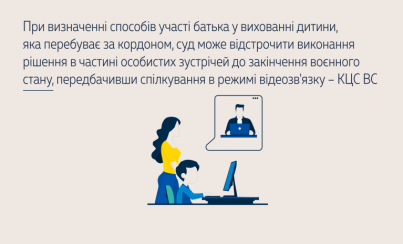Contact center of the Ukrainian Judiciary 044 207-35-46

The temporary departure of a child abroad should not be used as a way to restrict the rights of a parent to communicate with a child, which should be implemented to maintain family ties and emotional contact between a minor child and his or her father.
This conclusion was made by the panel of judges of the First Judicial Chamber of the Civil Cassation Court of the Supreme Court.
In this case, the father brought an action against the child's mother to remove obstacles to communication with his daughter and to determine the procedure for his participation in her upbringing. The plaintiff claimed that the mother had moved to Slovakia with the child without his knowledge, had obstructed communication by cutting the connection and had refused to return with the child to the place of permanent residence.
The court of first instance partially satisfied the claim, namely, determined the manner of the father's participation in the child's upbringing, but postponed the execution of the decision for the period of martial law and the child's stay in Slovakia. The court ordered the mother to arrange for the child to communicate with the father via video link every Tuesday, Thursday and Saturday.
The court of appeal reversed the decision of the court of first instance, postponing the meetings between the father and the child in Ukraine until the end of martial law. The court ordered the mother to arrange daily communication via video link. The court of appeal's ruling was motivated by the fact that the child's temporary departure abroad should not restrict the father's right to communicate with him, and martial law is not an obstacle to video communication.
The Civil Cassation Court of the Supreme Court agreed with the conclusions of the courts, noting that the temporary departure of a child abroad should not be used as a way to restrict the father's rights to communicate with the child. At the same time, the court of appeal reasonably postponed the execution of the decision on meetings between the father and the child in Ukraine until the end of martial law, suggesting instead that daily communication via video link, which, given the circumstances in the country, is in the best interests of the child.
International and national norms do not contain provisions that would give any parent a priority right to raise a child. On the contrary, international treaties and national legislation guarantee parents the principle of equality in the upbringing of their children.
The Supreme Court noted that Russia's military aggression against Ukraine, martial law and related restrictions objectively affect the scope and methods of communication not only between the plaintiff and his daughter, but also many other parents with their children, who also found themselves outside Ukraine as a result of the war. In this situation, the duty of both parents is to support the child, minimise the psychological pressure on the child caused by family conflicts, establish communication and cooperate in the child's interests.
Resolution of the Supreme Court of 12 March 2025 in case No. 487/2960/23 (proceedings No. 61-8756св24) - https://reyestr.court.gov.ua/Review/125933057.
This and other legal opinions of the Supreme Court are available in the Database of Legal Positions of the Supreme Court - https://lpd.court.gov.ua.